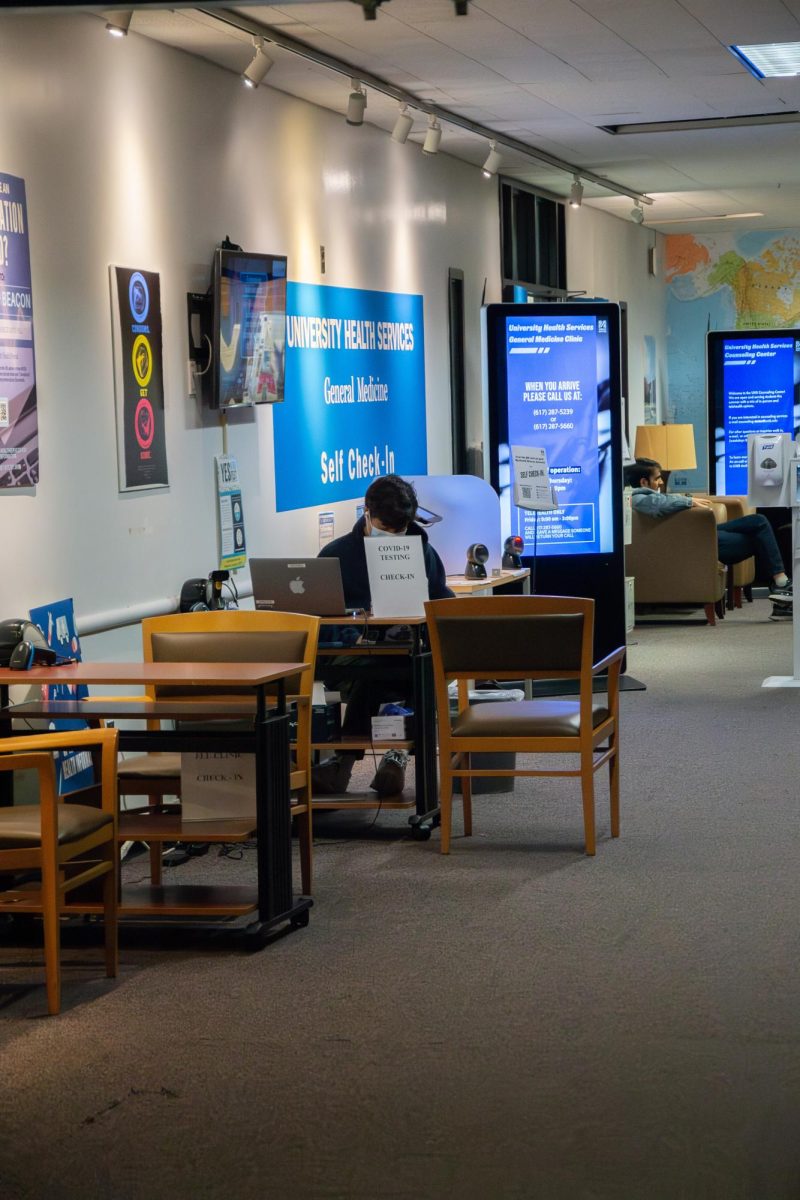My entire college career has been in the shadow of COVID-19. As a freshman in 2020, I spent my first year at UMass Boston staring at a screen—which, by the way, is hell for someone with a chronic migraine condition—withering away bit by bit in the desolate greyscale of my dorm. In each year following, I have seen the restrictions loosen more and more from indoor and outdoor mandates to strictly indoor and finally, this year. The year “without COVID-19.”
That’s the narrative that’s been circulating, at least. Everyone keeps claiming we’re returning to normalcy, and looking around campus, it sure would seem that way. No masks, limited access to once-bountiful tests, and the COVID-19 statements on syllabi have become as normal and obsolete to many members of the university as the resource statements.
There are 2,700 new cases across the state of Massachusetts as of Sept. 11, according to mass.gov (1). In Boston alone, there is a 13.92 percent positivity rate—or 4.8 residents per every 100,000 residents—with the average percent positivity reaching 12.32 percent. While these numbers are nowhere near 2020’s numbers, this slow uptick is not to be ignored. As classes continue to progress, these numbers will only increase as well, especially with the cold and flu season on the horizon.
At first glance, there seems to be a very simple solution to this. Come cold and flu season or with COVID-19 spikes, UMass Boston could once again require vaccinations and boosters for all members of the UMass Boston community, in contrast to an email sent by Chancellor Marcelo Suárez-Orozco May 5, as well as reinstate the mask policy they lifted Jan. 18 via an email from Executive Director of University Health Services Rob Pomales and Vice Chancellor for Human Resources Marie Bowen.
Though the university continues to claim to be “mask friendly”—as so many signs around campus proclaim—those who do wear masks are seen as the minority. I am one of, at most, five people in any of my classes wearing a mask, despite COVID-19 numbers rising by the day. I want to continue to protect others, as well as myself, but wearing a mask can often make me feel like a black sheep amongst all of my peers—many of whom ditched their face coverings as soon as the mandates were lifted. To ask for a mask mandate, or at the very least a consideration of one, would be a steep task riddled with pushback from the community, but it may be worth it to avoid UMass Boston becoming a super-spreader site.
I’m tired of COVID-19 too. But even with the lifted mask mandates, waived vaccine requirements, and a “normalcy” rolling out once again, we can’t act like COVID-19 has faded from existence. Frankly, I don’t think it’ll ever fade away, and I guess that’s part of life now. To some, COVID-19 will come and go like the common cold, rolling in and out each fall and winter.
But for some—myself included—this isn’t exactly a luxury we can have. Viruses like COVID-19, the flu or even the common cold are far more dangerous for immunocompromised people and those close to them. While some can take their mandated five to ten days to recover, rest and maybe pick up a new hobby, immunocompromised people may find themselves at risk for hospitalization, long term effects or even death.
While it may be easy to brush this off under the guise of not knowing anyone who may be immunocompromised, it’s a lot more common than people may think. Those with chronic illnesses like Type I diabetes, Lupus or rheumatoid arthritis; those who may be getting cancer treatments or have had organ transplants; smokers; those with asthma or older people are all at higher risk of COVID-19. Though someone may not directly be impacted by being immunocompromised, they may have friends or family members who are connected.
Being conscious of myself and others isn’t “living in fear” of a virus like some people may claim. Knowing that almost 23,000 people have died in Massachusetts alone from COVID-19 since its emergence in 2020 does not make me want to move on as if nothing happened. And while most of these deaths are from older people, there are plenty who were younger. I don’t want to put my family members at risk, much less any classmates or professor who may be living with these conditions.
Realistically, I can’t tell anyone to wear a mask. I also can’t tell the university to reinstate old policies. Though I would love for the university to, at the very least, consider reinstating a mask mandate come cold and flu season, I don’t see it happening—at least not without pushback. But what I can say, and will continue to urge, is be cautious and courteous. Just because the COVID-19 test comes back negative, that doesn’t mean some sickness can’t make someone seriously ill. Monitor symptoms come cold and flu season, and wear a mask if need be. Not just for your own health, but for everyone around you.
- https://www.mass.gov/info-details/covid-19-response-reporting

